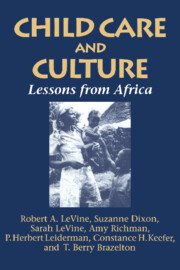Book contents
- Frontmatter
- Contents
- List of tables and figures
- Foreword
- Acknowledgments
- Introduction
- Part I African infancy: Frameworks for understanding
- 1 The comparative study of child care
- 2 Infant care in sub-Saharan Africa
- Part II Parenthood among the Gusii of Kenya
- Part III Infant care and development in a Gusii community
- Part IV Interpretations
- Appendix A Fieldwork procedures: Initial phases and planning
- Appendix B Coding categories for spot observations
- Appendix C Blankhart Nutrition Questionnaire
- Appendix D Temperament Assessment Method
- Appendix E Coding categories for narrative observations
- Appendix F Coding categories for face-to-face interaction
- Appendix G Coding categories for maternal teaching task
- Appendix H Supplementary tables
- Notes
- References
- Index
- Plate section
1 - The comparative study of child care
from Part I - African infancy: Frameworks for understanding
Published online by Cambridge University Press: 11 May 2010
- Frontmatter
- Contents
- List of tables and figures
- Foreword
- Acknowledgments
- Introduction
- Part I African infancy: Frameworks for understanding
- 1 The comparative study of child care
- 2 Infant care in sub-Saharan Africa
- Part II Parenthood among the Gusii of Kenya
- Part III Infant care and development in a Gusii community
- Part IV Interpretations
- Appendix A Fieldwork procedures: Initial phases and planning
- Appendix B Coding categories for spot observations
- Appendix C Blankhart Nutrition Questionnaire
- Appendix D Temperament Assessment Method
- Appendix E Coding categories for narrative observations
- Appendix F Coding categories for face-to-face interaction
- Appendix G Coding categories for maternal teaching task
- Appendix H Supplementary tables
- Notes
- References
- Index
- Plate section
Summary
Ever since Margaret Mead published Growing Up in New Guinea in 1930, it has been evident that knowledge of cultural variations in child rearing is essential to an understanding of human development. Mead introduced the idea that the diverse peoples of the world constitute a great laboratory of child development, with each culture representing a different set of experimental conditions for the rearing of children. The anthropological observer interested in questions of early education had only to “read the answers” from the experiment conducted for over a thousand years by a particular culture. Mead envisioned, for example, that her ethnographic report on the Manus people, whose children spent their days free of parental control, would help resolve the debate over “permissive” child rearing in America at that time.
The notion of cultural diversity as a laboratory offering “natural experiments” to the child development investigator has continued to excite interest in the cross-cultural study of child rearing, but reading the answers proved more complicated than Mead anticipated in 1930. This is partly because the metaphor of a laboratory experiment makes the interpretation of results seem simpler than it is. In an experiment, the investigator controls the background conditions thought likely to affect the outcome in order to focus on one or two factors of interest, which are permitted to vary. But the conditions of childhood in Manus differ from those of American children in a great many ways other than the amount of parental supervision, and predicting the effects of “permissiveness” in the United States from observations made in New Guinea is highly conjectural.
- Type
- Chapter
- Information
- Child Care and CultureLessons from Africa, pp. 7 - 21Publisher: Cambridge University PressPrint publication year: 1994



